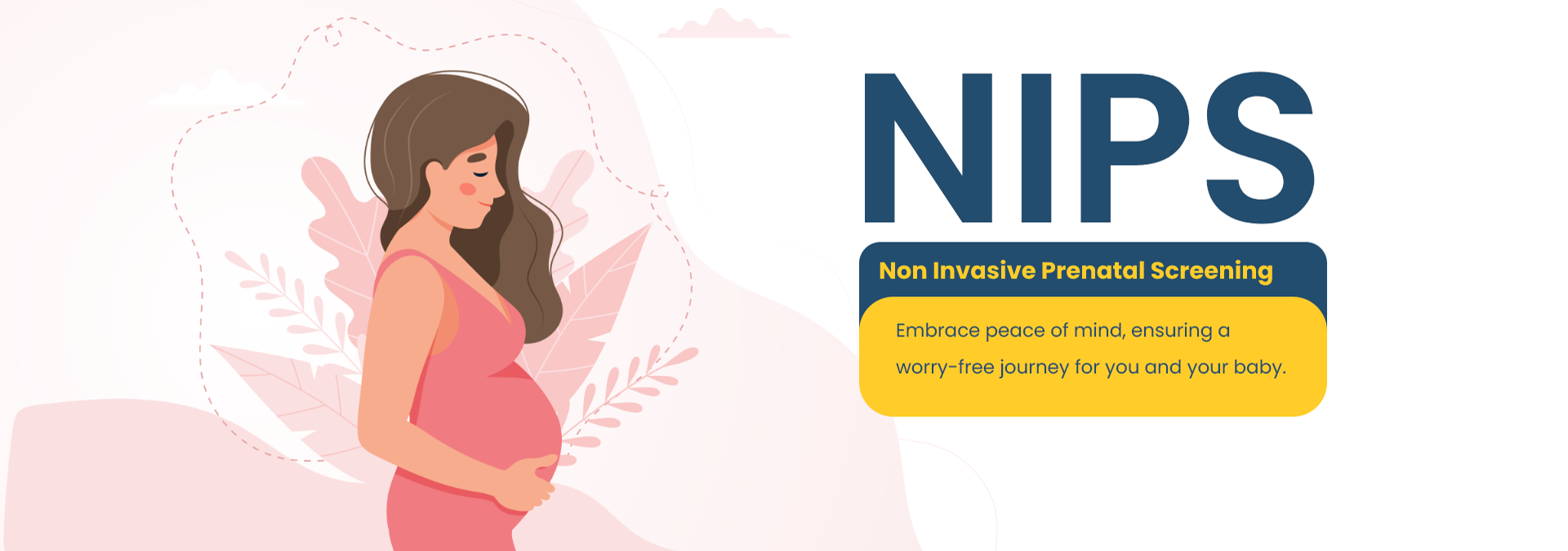Overview
About NIPS
Non-Invasive Prenatal Screening (NIPS) is a revolutionary advancement in prenatal care that utilises cutting-edge technology to analyse cell-free foetal DNA present in the mother's blood.

Early Pregnancy Chromosomal Abnormality Detection: Detect chromosomal abnormalities in the early stages of pregnancy.

Non-Invasive Alternative: Avoid invasive procedures like amniocentesis or chorionic villus sampling.

Informed Decision-Making: Gain peace of mind and make informed decisions regarding your pregnancy.
Who should get tested
NIPS is recommended for all pregnant women, irrespective of age or risk factors. It provides valuable information about the baby's genetic health. Although mostly recommended for:

Maternal
age over 35

Previous pregnancy with chromosomal abnormalities

Positive results from other prenatal screening tests

Family history of
genetic disorders
No special preparations are required.
Evaluating NIPS Test Results
NIPS report provides you with the information which shows whether the baby is at a low-risk or high-risk of having chromosomal aneuploidies.
Parameter
For Patient
NIPS Test: A Valuable Tool in Prenatal Care
The NIPS test is a non-invasive prenatal screening tool used to assess the risk of chromosomal abnormalities in unborn babies. It is a safe and accurate screening option that offers valuable insights into fetal health.
What does NIPS Test Detect?
Here are some conditions that NIPS can detect with exceptional accuracy:
(Trisomy 21)
(Trisomy 18)
(Trisomy 13)
abnormalities
For Doctors
Collaborating with Pathkind Labs for NIPS Testing
By partnering with Pathkind Labs, we are fully dedicated to upholding the
highest standards of care for our patients, guaranteeing accurate and reliable NIPS testing services.

Safe
Non-invasive with no risk of miscarriage
Accurate
>99% sensitivity for detection of trisomy conditions
Simple
Test from only 10 ml of meternal blood as early as week 10 of pregnancyTest perfomed on Fetal DNA in meternal blood
Frequently asked questions
All pregnant women, irrespective of age or risk factors, are recommended to undergo NIPS screening for comprehensive prenatal care.
A simple blood sample from the mother is all that is required for the NIPS test, making it a convenient and non-invasive procedure.
Yes, there are different variants of the NIPS test available, offering various options for screening multiple genetic conditions based on individual needs.
The NIPS test is performed by analysing cell-free foetal DNA present in the mother's blood, providing accurate insights into the baby's genetic health.
Yes, the NIPS test is recommended for all pregnant women as part of comprehensive prenatal care to detect potential chromosomal abnormalities and genetic conditions.
The NIPS test is considered safe and carries no significant risks for both the mother and the baby, as it involves a simple blood sample.
The NIPS test results are highly accurate, with a low rate of false-positive and false-negative results, providing reliable information about the baby's genetic health.
If your NIPS test results come back positive, additional confirmatory tests may be recommended to obtain a conclusive diagnosis and further guidance.
Yes, the NIPS test can determine the gender of the unborn child with a high level of accuracy, offering insights into the baby's genetic characteristics. But Prenatal sex determination was banned in India in 1994, under the Pre-Conception and Pre-Natal Diagnostic Techniques Act 1994.


















